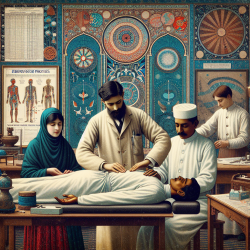Unlocking the Power of Osteopathic Principles in Modern Practice
As practitioners, we often find ourselves navigating the complex landscape of healthcare, balancing between traditional practices and modern evidence-based approaches. The research article "Historical Osteopathic Principles and Practices in Contemporary Care: An Anthropological Perspective to Foster Evidence-Informed and Culturally Sensitive Patient-Centered Care: A Commentary" provides a profound insight into how we can bridge this gap and enhance our practice.
The Dilemma: Tradition vs. Evidence
The osteopathic profession, much like many others, is divided between those who adhere to historical osteopathic principles and those who advocate for evidence-based practices. This polarity often creates a tension that can hinder the delivery of effective patient care. The commentary suggests that by refocusing on patient values and expectations, practitioners can create a more inclusive and culturally sensitive practice.
Embracing Cultural Sensitivity
One of the key takeaways from the research is the importance of cultural sensitivity in patient-centered care. By understanding and integrating diverse sociocultural health assumptions, practitioners can provide care that is respectful and inclusive of all patients. This approach not only improves patient satisfaction but also enhances clinical outcomes.
Implementing the Findings in Your Practice
- Focus on Patient Values: Engage with your patients to understand their cultural backgrounds and health beliefs. This understanding will help tailor your approach to meet their specific needs.
- Integrate Diverse Health Assumptions: Incorporate both Western and non-Western health beliefs into your practice to create a more holistic approach to care.
- Promote Inclusivity: Ensure that your practice environment is welcoming and inclusive, recognizing the diverse backgrounds of your patients.
Encouraging Further Research
The commentary also highlights the need for further research to explore the integration of historical osteopathic principles with contemporary evidence-based practices. By participating in or supporting such research, practitioners can contribute to the evolution of the osteopathic profession and ensure it remains relevant and effective in today's healthcare landscape.
To read the original research paper, please follow this link: Historical Osteopathic Principles and Practices in Contemporary Care: An Anthropological Perspective to Foster Evidence-Informed and Culturally Sensitive Patient-Centered Care: A Commentary.










